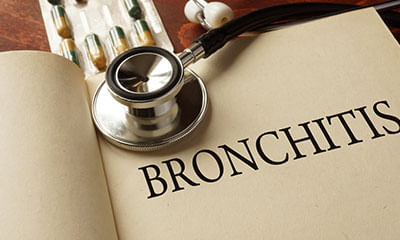Bronchiolitis - Its Treatment In Homeopathy!
Bronchiolitis, Is a common lung infection in young children and infants. It causes inflammation and congestion in the small airways (bronchioles) of the lung. Bronchiolitis is almost always caused by a virus. Typically, the peak time for bronchiolitis is during the winter months.
Bronchiolitis starts out with symptoms similar to those of a common cold but then progresses to coughing, wheezing and sometimes difficulty breathing. Symptoms of bronchiolitis can last for several days to weeks, even a month.
For the first few days, the signs and symptoms of bronchiolitis are similar to those of a cold:
- Runny nose
- Stuffy nose
- Cough
- Slight fever (not always present)
Bronchiolitis occurs when a virus infects the bronchioles, which are the smallest airways in your lungs. The infection makes the bronchioles swell and become inflamed. Mucus collects in these airways, which makes it difficult for air to flow freely in and out of the lungs.
Most cases of bronchiolitis are caused by the respiratory syncytial virus (rsv). Rsv is a common virus that infects just about every child by the age of 2. Outbreaks of the rsv infection occur every winter. Bronchiolitis can also be caused by other viruses, including those that cause the flu or the common cold. Infants can be reinfected with rsv because at least two strains exist.
The viruses that cause bronchiolitis are easily spread. You can contract them through droplets in the air when someone who is sick coughs, sneezes or talks. You can also get them by touching shared objects — such as utensils, towels or toys — and then touching your eyes, nose or mouth.
Risk factors- Infants younger than 3 months of age are at greatest risk of getting bronchiolitis because their lungs and immune systems aren't yet fully developed.
Other factors that are associated with an increased risk of bronchiolitis in infants, or more severe illness due to bronchiolitis, include:
- Premature birth
- An underlying heart or lung condition
- A depressed immune system
- Exposure to tobacco smoke
- Never having been breast-fed — breast-fed babies receive immune benefits from the mother
- Contact with multiple children, such as in a child care setting
- Living in a crowded environment
- Having siblings who attend school or child care and bring home the infection
Prevention
Limit contact with people who have a fever or cold. If your child is a newborn, especially a premature newborn, avoid exposure to people with colds in the first two months of life.
Clean and disinfect surfaces. Clean and disinfect surfaces and objects that people frequently touch, such as toys and doorknobs. This is especially important if a family member is sick.
Cover coughs and sneezes. Cover your mouth and nose with a tissue. Then throw away the tissue and wash your hands or use alcohol hand sanitizer.
Use your own drinking glass. Don't share glasses with others, especially if someone in your family is ill.
Wash hands often. Frequently wash your own hands and those of your child. Keep an alcohol-based hand sanitizer handy for yourself and your child when you're away from home.
Breast-feed. Respiratory infections are significantly less common in breast-fed babies.
Homoeopathic medicines.
- Aconitum napellus - aconite will often prevent the development of a thorough bronchitis. Aconite is prescribed in bronchitis to the onset of the affection. It is caused by as a result of checked perspiration, exposure to cold, drafts or dry, cold winds. The complaint starts with a coryza, frequent sneezing. Chilliness, restless sleep, full, hard pulse, and the characteristic mental condition like anxiety and restlessness
Arsenic album is one of the best homeopathic medicines for symptoms that include a feeling of weakness along with other signs of bronchitis. Extreme wheezing and cough increase after nighttime and makes it difficult for the person to sleep. Along with extreme weakness, restlessness may also occur. The patient feels parched and frequently drinks little quantities of water.
- Bryonia alba -bryonia alba is the top homeopathic medicine for treating bronchitis, and is mainly used when the cough is dry. Mucus if present is very difficult to cough out and may be rust coloured. Bryonia alba can also prove very useful for treatment of severe chest pains during coughing. The patient usually feels relieved by taking rest and gets worse on motion. The patient may show an increased thirst for large quantities of water.
- Phosphorus -phosphorus is another very beneficial homeopathic medicine for patients of bronchitis. The patient mainly has a hard and dry cough. The cough is renewed by laughing and talking. Cold air usually worsens the cough. Excessive heat in chest could be another accompanying symptom. The patient at times complains of tightness, heaviness and oppression of chest, along with chest pains. The mucus when expectorated may be blood-stained. The patient may also have a craving for cold drinks, ice cream and juices.
- Antimonium tart - antimonium tart is a very effective natural remedy for bronchitis that is mainly prescribed when the bronchial tubes are overloaded with mucus. The mucus rattles in the chest. The mucus is not coughed out with ease and if it does cough out, the quantity is meager. Homeopathic medicine antimonium tart is of great help in emptying the bronchial tubes by aiding the expectoration of the mucus present in bronchial tubes. The respiratory troubles after exposure to damp places frequently call for use of this natural homeopathic remedy.
- Spongia -the cases of bronchitis that can be treated wonderfully with homeopathic medicine spongia are the ones presenting with dry cough and complete dryness of air passages. There is a total absence of any mucus rales in chest. Mainly warm drinks provide relief to the patient. The patient also at times complains of chest oppression, weakness and difficulty in breathing.
- Ipecac -ipecac is the top homeopathic remedy for bronchitis with a constant cough and rattling of mucus in chest. Even constant coughing does not seem to help in expelling the mucus from bronchi. Ipecac helps in expelling the mucus out with the least effort. An important feature for using this homeopathic medicine in bronchitis is vomiting with coughing providing some relief to the patient.
Mercurius -merc. Is another effective remedy for bronchitis. There is roughness and soreness from the fauces down through the middle of the chest. The cough is dry, raw and concussive which is very exhausting. The sputum is watery, saliva-like, or yellow and muco-purulent. There is fever and alternation of hills and heat, desire for cold drinks, which aggravate the cough. And pasty sweat without relief.
Belladonna, rhus toxicodendron 30-belladonna and rhus tox are important homeopathic remedies for bronchitis when it is accompanied with fever. Belladona is the top natural homeopathic remedy for fever when extreme heat in body is present with bronchitis. There is usually an absence of thirst. Homeopathic medicine rhus tox is prescribed when utmost body aches accompany fever in bronchitis
Kali carb - kali carb is the best homeopathic choice when the whole chest is very sore, sensitive and painful. There is extreme coldness in chest along with pains. Bending forward may bring a slight relief from chest pain.
Sulphur -sulphur is effective for chronic bronchitis. Catarrh of the bronchial mucous membranes is accompanied with loud rales, a persistent, profuse, thick, muco-purulent expectoration and attended by suffocative attacks. Cough with rattling of mucus in the chest, expectoration loose, worse after bathing and in the morning.
Hepar sulph is one of the best homeopathic medicines for bronchitis where a person experiences increased sensitivity to cold. Chilly air and exposure to the cold in any form is impossible to be tolerated by the patient. It energizes cough quickly. Hepar sulph cures situations where even if a single part of the body is exposed to the cold like a hand or a foot, cough begins immediately.
Don’t use any homeopathic remedies without any prescription.



+1.svg)
